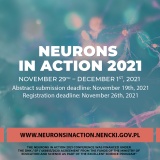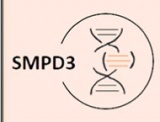News
 The Nencki Institute and the Nencki Foundation would like to cordially invite you to take part in the 4th edition of the Neurons in Action symposium
The Nencki Institute and the Nencki Foundation would like to
cordially invite you to take part in the 4th edition of the Neurons in
Action symposium (November 29th-December 1st, 2021). This years’ meeting
will be held online to ensure safety of all participants in the time of the
pandemic.
In this format we will host world-class neurobiologists who
will present their latest research focused on neuronal mechanisms of
inheritance of behavioral phenotypes, aberrant synaptic plasticity, formation
of fear memory and spatial memory, dynamic changes in activity of neuronal
circuits and processing of memories in humans. The plenary talk will be given
by Prof. Cornelius Gross (EMBL-Rome). We also encourage participants to present
their own findings during the poster session and to attend a career
workshop.
Registration is now open at https://neuronsinaction.nencki.gov.pl/
Abstract submission deadline: November 19th, 2021
Registration deadline: November 26th, 2021.
The Nencki Institute and the Nencki Foundation would like to cordially invite you to take part in the 4th edition of the Neurons in Action symposium
The Nencki Institute and the Nencki Foundation would like to
cordially invite you to take part in the 4th edition of the Neurons in
Action symposium (November 29th-December 1st, 2021). This years’ meeting
will be held online to ensure safety of all participants in the time of the
pandemic.
In this format we will host world-class neurobiologists who
will present their latest research focused on neuronal mechanisms of
inheritance of behavioral phenotypes, aberrant synaptic plasticity, formation
of fear memory and spatial memory, dynamic changes in activity of neuronal
circuits and processing of memories in humans. The plenary talk will be given
by Prof. Cornelius Gross (EMBL-Rome). We also encourage participants to present
their own findings during the poster session and to attend a career
workshop.
Registration is now open at https://neuronsinaction.nencki.gov.pl/
Abstract submission deadline: November 19th, 2021
Registration deadline: November 26th, 2021.
 Dr. Wojciech Kuban enters the EU Joint Programe of Neurodegenerative Disease Research JPND
Dr. Wojciech Kuban from the Department of Department of Pharmacokinetics and Drug Metabolism together with the international consortium of researchers from Klinikum rechts der Isar der TU München, Helmholz-Zentrum München, Muskelzentrum/ALS Clinic St. Gallen, Le Centre Hospitalier Régional Universitaire de Tours, Hebrew University - Hadassah Medical Center Jerusalem, Göteborgs Universitet and external collaborators from Flinders University Adelaide, Universitätsmedizin Göttingen and University of Miami were awarded funding from the JPND program for their ambitious project titled "A premotor disease signature for ALS" (premodiALS). The aim of the project is to identify early molecular markers that occur before the motor symptoms of ALS disease, i.e permanent damage to the upper and lower motor neurons with a devastating prognosis. The research will be conducted on clinical samples from patients from different countries using advanced diagnostic technology: mass spectrometry and targeted quantitative immunoassay. The obtained results will be additionally integrated and modeled by the bioinformatics team. The identified molecular marker will also be associated with general pathological patterns of ALS. The research aims to enable early detection of the disease, improve diagnostic accuracy, but also provide information on the molecular and pathophysiological causes of ALS, enabling effective treatment in the initial stage of the disease.Congratulations!
Dr. Wojciech Kuban enters the EU Joint Programe of Neurodegenerative Disease Research JPND
Dr. Wojciech Kuban from the Department of Department of Pharmacokinetics and Drug Metabolism together with the international consortium of researchers from Klinikum rechts der Isar der TU München, Helmholz-Zentrum München, Muskelzentrum/ALS Clinic St. Gallen, Le Centre Hospitalier Régional Universitaire de Tours, Hebrew University - Hadassah Medical Center Jerusalem, Göteborgs Universitet and external collaborators from Flinders University Adelaide, Universitätsmedizin Göttingen and University of Miami were awarded funding from the JPND program for their ambitious project titled "A premotor disease signature for ALS" (premodiALS). The aim of the project is to identify early molecular markers that occur before the motor symptoms of ALS disease, i.e permanent damage to the upper and lower motor neurons with a devastating prognosis. The research will be conducted on clinical samples from patients from different countries using advanced diagnostic technology: mass spectrometry and targeted quantitative immunoassay. The obtained results will be additionally integrated and modeled by the bioinformatics team. The identified molecular marker will also be associated with general pathological patterns of ALS. The research aims to enable early detection of the disease, improve diagnostic accuracy, but also provide information on the molecular and pathophysiological causes of ALS, enabling effective treatment in the initial stage of the disease.Congratulations!
 Polymorphisms of the sphingomyelinase gene affect the risk of depression and alcoholism
The latest issue of
Molecular Psychiatry features a report from an international team of scientists
that included researchers from the Department of Drug Addiction Pharmacology at
our Institute that points to the involvement of disrupted function of the enzyme
sphingomyelinase in the risks of developing alcohol dependence, mood disorders,
and also abnormal bone mineralization. https://doi.org/10.1038/s41380-021-01304-w. The Authors observed that polymorphisms
in the gene encoding sphingomyelinase (SMPD3) had a significant correlation with alcoholism and
depression in a cohort of almost 500 000 volunteers that participated in the
study. Moreover, experiments conducted using genetically modified mice with
inactivation of the Smpd3 gene confirmed its significance for
alcohol-related behaviors and also revealed accompanying changes at the
neuronal level. Congratulations to the Authors!
Polymorphisms of the sphingomyelinase gene affect the risk of depression and alcoholism
The latest issue of
Molecular Psychiatry features a report from an international team of scientists
that included researchers from the Department of Drug Addiction Pharmacology at
our Institute that points to the involvement of disrupted function of the enzyme
sphingomyelinase in the risks of developing alcohol dependence, mood disorders,
and also abnormal bone mineralization. https://doi.org/10.1038/s41380-021-01304-w. The Authors observed that polymorphisms
in the gene encoding sphingomyelinase (SMPD3) had a significant correlation with alcoholism and
depression in a cohort of almost 500 000 volunteers that participated in the
study. Moreover, experiments conducted using genetically modified mice with
inactivation of the Smpd3 gene confirmed its significance for
alcohol-related behaviors and also revealed accompanying changes at the
neuronal level. Congratulations to the Authors!
 We encourage you to watch the film from this year's Neurobiological boat.
The
neurobiological boat, traditionally organized by the Maj Institute of
Pharmacology Polish Academy of Sciences, is a science outreach event
designed to popularize neurobiology and brain sciences.The event was co-financed by the "Social Responsibility of Science" program of the Minister of Science and Higher Education.
We encourage you to watch the film from this year's Neurobiological boat.
The
neurobiological boat, traditionally organized by the Maj Institute of
Pharmacology Polish Academy of Sciences, is a science outreach event
designed to popularize neurobiology and brain sciences.The event was co-financed by the "Social Responsibility of Science" program of the Minister of Science and Higher Education.

 The Nencki Institute and the Nencki Foundation would like to cordially invite you to take part in the 4th edition of the Neurons in Action symposium
The Nencki Institute and the Nencki Foundation would like to
cordially invite you to take part in the 4th edition of the Neurons in
Action symposium (November 29th-December 1st, 2021). This years’ meeting
will be held online to ensure safety of all participants in the time of the
pandemic.
In this format we will host world-class neurobiologists who
will present their latest research focused on neuronal mechanisms of
inheritance of behavioral phenotypes, aberrant synaptic plasticity, formation
of fear memory and spatial memory, dynamic changes in activity of neuronal
circuits and processing of memories in humans. The plenary talk will be given
by Prof. Cornelius Gross (EMBL-Rome). We also encourage participants to present
their own findings during the poster session and to attend a career
workshop.
Registration is now open at https://neuronsinaction.nencki.gov.pl/
Abstract submission deadline: November 19th, 2021
Registration deadline: November 26th, 2021.
The Nencki Institute and the Nencki Foundation would like to cordially invite you to take part in the 4th edition of the Neurons in Action symposium
The Nencki Institute and the Nencki Foundation would like to
cordially invite you to take part in the 4th edition of the Neurons in
Action symposium (November 29th-December 1st, 2021). This years’ meeting
will be held online to ensure safety of all participants in the time of the
pandemic.
In this format we will host world-class neurobiologists who
will present their latest research focused on neuronal mechanisms of
inheritance of behavioral phenotypes, aberrant synaptic plasticity, formation
of fear memory and spatial memory, dynamic changes in activity of neuronal
circuits and processing of memories in humans. The plenary talk will be given
by Prof. Cornelius Gross (EMBL-Rome). We also encourage participants to present
their own findings during the poster session and to attend a career
workshop.
Registration is now open at https://neuronsinaction.nencki.gov.pl/
Abstract submission deadline: November 19th, 2021
Registration deadline: November 26th, 2021.
 Dr. Wojciech Kuban enters the EU Joint Programe of Neurodegenerative Disease Research JPND
Dr. Wojciech Kuban from the Department of Department of Pharmacokinetics and Drug Metabolism together with the international consortium of researchers from Klinikum rechts der Isar der TU München, Helmholz-Zentrum München, Muskelzentrum/ALS Clinic St. Gallen, Le Centre Hospitalier Régional Universitaire de Tours, Hebrew University - Hadassah Medical Center Jerusalem, Göteborgs Universitet and external collaborators from Flinders University Adelaide, Universitätsmedizin Göttingen and University of Miami were awarded funding from the JPND program for their ambitious project titled "A premotor disease signature for ALS" (premodiALS). The aim of the project is to identify early molecular markers that occur before the motor symptoms of ALS disease, i.e permanent damage to the upper and lower motor neurons with a devastating prognosis. The research will be conducted on clinical samples from patients from different countries using advanced diagnostic technology: mass spectrometry and targeted quantitative immunoassay. The obtained results will be additionally integrated and modeled by the bioinformatics team. The identified molecular marker will also be associated with general pathological patterns of ALS. The research aims to enable early detection of the disease, improve diagnostic accuracy, but also provide information on the molecular and pathophysiological causes of ALS, enabling effective treatment in the initial stage of the disease.Congratulations!
Dr. Wojciech Kuban enters the EU Joint Programe of Neurodegenerative Disease Research JPND
Dr. Wojciech Kuban from the Department of Department of Pharmacokinetics and Drug Metabolism together with the international consortium of researchers from Klinikum rechts der Isar der TU München, Helmholz-Zentrum München, Muskelzentrum/ALS Clinic St. Gallen, Le Centre Hospitalier Régional Universitaire de Tours, Hebrew University - Hadassah Medical Center Jerusalem, Göteborgs Universitet and external collaborators from Flinders University Adelaide, Universitätsmedizin Göttingen and University of Miami were awarded funding from the JPND program for their ambitious project titled "A premotor disease signature for ALS" (premodiALS). The aim of the project is to identify early molecular markers that occur before the motor symptoms of ALS disease, i.e permanent damage to the upper and lower motor neurons with a devastating prognosis. The research will be conducted on clinical samples from patients from different countries using advanced diagnostic technology: mass spectrometry and targeted quantitative immunoassay. The obtained results will be additionally integrated and modeled by the bioinformatics team. The identified molecular marker will also be associated with general pathological patterns of ALS. The research aims to enable early detection of the disease, improve diagnostic accuracy, but also provide information on the molecular and pathophysiological causes of ALS, enabling effective treatment in the initial stage of the disease.Congratulations!
 Polymorphisms of the sphingomyelinase gene affect the risk of depression and alcoholism
The latest issue of
Molecular Psychiatry features a report from an international team of scientists
that included researchers from the Department of Drug Addiction Pharmacology at
our Institute that points to the involvement of disrupted function of the enzyme
sphingomyelinase in the risks of developing alcohol dependence, mood disorders,
and also abnormal bone mineralization. https://doi.org/10.1038/s41380-021-01304-w. The Authors observed that polymorphisms
in the gene encoding sphingomyelinase (SMPD3) had a significant correlation with alcoholism and
depression in a cohort of almost 500 000 volunteers that participated in the
study. Moreover, experiments conducted using genetically modified mice with
inactivation of the Smpd3 gene confirmed its significance for
alcohol-related behaviors and also revealed accompanying changes at the
neuronal level. Congratulations to the Authors!
Polymorphisms of the sphingomyelinase gene affect the risk of depression and alcoholism
The latest issue of
Molecular Psychiatry features a report from an international team of scientists
that included researchers from the Department of Drug Addiction Pharmacology at
our Institute that points to the involvement of disrupted function of the enzyme
sphingomyelinase in the risks of developing alcohol dependence, mood disorders,
and also abnormal bone mineralization. https://doi.org/10.1038/s41380-021-01304-w. The Authors observed that polymorphisms
in the gene encoding sphingomyelinase (SMPD3) had a significant correlation with alcoholism and
depression in a cohort of almost 500 000 volunteers that participated in the
study. Moreover, experiments conducted using genetically modified mice with
inactivation of the Smpd3 gene confirmed its significance for
alcohol-related behaviors and also revealed accompanying changes at the
neuronal level. Congratulations to the Authors!
 We encourage you to watch the film from this year's Neurobiological boat.
The
neurobiological boat, traditionally organized by the Maj Institute of
Pharmacology Polish Academy of Sciences, is a science outreach event
designed to popularize neurobiology and brain sciences.The event was co-financed by the "Social Responsibility of Science" program of the Minister of Science and Higher Education.
We encourage you to watch the film from this year's Neurobiological boat.
The
neurobiological boat, traditionally organized by the Maj Institute of
Pharmacology Polish Academy of Sciences, is a science outreach event
designed to popularize neurobiology and brain sciences.The event was co-financed by the "Social Responsibility of Science" program of the Minister of Science and Higher Education.





